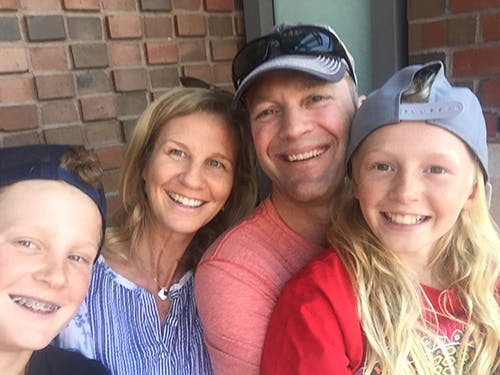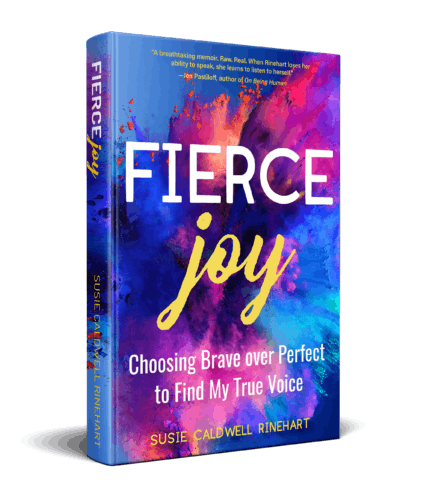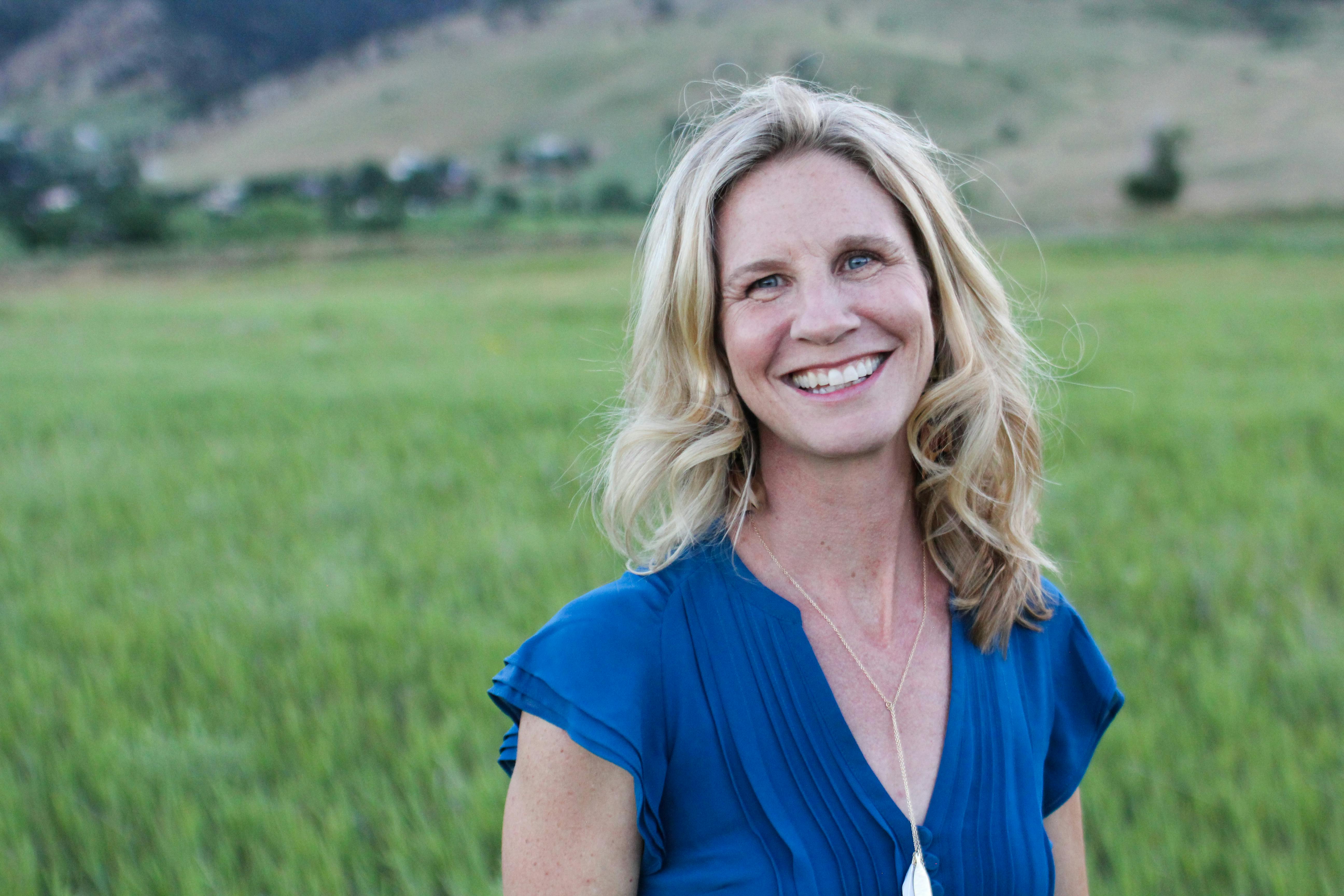“I decided to choose joy over fear, and brave over perfect.”
– Susie Rinehart, chordoma patient
Susie Rinehart has always been strong. She’s a mom, a leadership coach, an international girls’ empowerment advocate, and an ultrarunner. But beneath the veneer of confidence and success, she struggled with anxiety and depression, feelings she neither shared nor confronted until a diagnosis of chordoma forced her to reconsider how she wanted to live.
In June of 2016, two weeks after winning an ultramarathon in the rocky mountains, Susie was diagnosed with a cervical chordoma. She was told that without surgery, she had less than five months to live and that even with surgery, the road ahead would be painful and complicated. In that moment, her entire life’s focus shifted from “What do I need to achieve?” to “How do I want to live?”
Through 36 hours of surgery, two craniotomies, a neck fusion, and weeks of daily radiation therapy, she thought about this question, always with her husband and two children at the front of her mind.
Having lost her voice after the initial surgeries, Susie learned that the best way to gain it back was to sit still, do less, and listen more. So she slowed down and opened her ears and her mind to the world around her in a way she hadn’t before.

She listened to her doctors, she listened to her fellow patients, and, most of all, she listened to her family. Her children, she learned, were even more deliciously creative, insightful, and brave than she realized, filled with the strength and wildness that comes with being young and unencumbered by the voices and expectations of the world.
She began writing them letters filled with the stories and lessons of her life — what she had learned about love, control, work, success, and joy. As she wrote, however, she realized there were sometimes gaps between the advice she gave and the decisions she herself had made, which led to an awakening.
“I stopped telling my daughter and son what to do and started trying to lead by example. I dared myself to listen to my joy and ask how I felt about the world rather than how the world felt about me.”

Susie’s thoughts became letters, and then blogs, and then a book, Fierce Joy, published in 2019. In it, she writes about authenticity and what gets in the way — perfectionism, people-pleasing, fear — and the power of showing up as our whole, true selves.
Order Fierce Joy at susierinehart.com/fierce-joy/
Survivorship
After four years of treatments and recoveries, Susie’s tumor is inactive, and she is thriving. But like many people who live through and beyond chordoma, she didn’t think of herself as a survivor.
“At first I thought survivors meant that you’d been cured. I thought I had to correct people who called me a survivor.”
It took time and reflection for Susie to develop a relationship with the idea of survivorship. She now sees her chordoma as a chronic disease, something she lives with and manages every year. Instead of letting it define her, she has allowed it to become one of many parts of who she is.
“Even when I was running ultramarathons and winning races against other ultrarunners, I never considered myself a ‘true’ ultrarunner. I still had that outsider-insider feeling. That’s how it’s been with chordoma. I AM a survivor. And I do see myself that way now. But I am not ONLY a survivor. And that’s important too.”
The time of diagnosis is not the only time to seek resources. Survivorship is its own kind of journey, filled with new experiences. Having a reliable place to turn when tackling the physical, emotional, spiritual, and practical challenges commonly experienced after treatment is important. That’s why the Chordoma Foundation launched the Chordoma Survivorship Initiative, aimed at providing patients and families with the information, support, and resources needed to get care and live well both during and after treatment.
Connections
Susie is now a trained life coach, and her practice focuses on helping people thrive in times of transition. She knows first-hand the need to embrace and address stress and uncertainty while also not wanting to be defined by it. And she has experienced the power of connecting with people who get the ‘whole you’ — the part living in crisis or illness and also the part parenting school-age kids or navigating a career change.
“I remember sitting in the waiting room of the proton beam radiation center at Massachusetts General Hospital day after day, and finally getting brave enough to start talking to the people around me. For so long, I had wanted to think of myself as different. I had wanted to be among the well, not the sick. But when I finally opened myself up, I built lasting friendships with people who truly got it. People who could talk about craniotomies and home-schooling in the same breath, and who saw me as Susie, not as some person with cancer.”

Susie has since extended those connections to the Foundation. Her care team – Dr. Liebsch, Dr. McDonald, and Dr. Cote – all encouraged her not to be afraid to reach out. And when she did, it felt different. She found information, resources, and people she could relate to. And now, she’s becoming one of those resources herself.
Join us at 1 PM ET on November 18, 2020, for our webinar, Living Well: Caring for yourself during stressful times, featuring Susie along with Amy Bragman, a Licensed Clinical Social Worker at MD Anderson Cancer Center. With the usual stressors of the holiday season on the way – this year in the midst of a pandemic – the two will share inspiration and strategies for self-care during these uniquely uncertain times, followed by discussion and live Q&A.
Registration is now closed
About the Chordoma Survivorship Initiative
Dealing with quality of life issues that have serious impacts on the well-being of patients and their family members is a common experience in our chordoma community. The goal of the Chordoma Survivorship Initiative is to provide you with information, support, and resources to help you get the care and assistance you need to live well during and after treatment. Existing resources include those listed below, with more to come in near future
As the initiative expands, your input will be critical to ensuring it meets your needs and the needs of our community as a whole. In order to learn more from you, we’ve developed a survey tailored to our community, focusing on chordoma survivorship and quality of life. The survey is now closed.